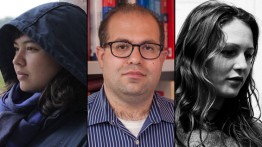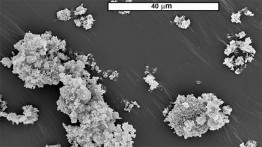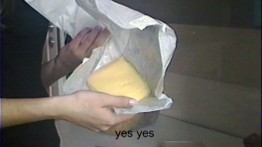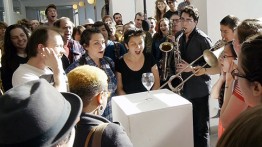Three Cooper Grads Receive 2015 Fulbright Grants
POSTED ON: May 11, 2015
Three alumni of The Cooper Union, including one current member of the faculty and a student graduating this year, have each been awarded a prestigious Fulbright travel grant in 2015. Daniel Lepek ChE’04, associate professor of chemical engineering, will go to Austria as part of the Core U.S. Fulbright Scholar Program to further develop his work in the use of nanoparticles in pharmaceuticals. Amanda Machnik A’15 and Jasmine Stein A’13 have been awarded U.S. Student Program grants to Poland and Italy, respectively, where each will develop a project founded in their artistic practice.
Professor Lepek will use his Fulbright award to teach and do research at Graz University of Technology [TU Graz] in southeastern Austria during the 2015-2016 academic year. Professor Lepek’s expertise is in the field of nanoparticles — miniscule particles 1/100th of a nanometer or less — that may be used to facilitate drug manufacturing, among many other applications. He will help improve engineering education at TU Graz by bringing materials from two courses he has taught at the Albert Nerken School of Engineering to the students there. The use of nanotechnology in pharmaceutical processing is a new field of study in Austria, he says.
"I want to help them bring new insights on nanoparticles into their classes, particularly 'Particle Technology' and 'Pharmaceutical Engineering,' and to improve the educational quality of those classes," Professor Lepek says.
He will also conduct laboratory work at the university’s Research Center in Pharmaceutical Engineering, where his expertise in nanotechnology will be incorporated into the production of pharmaceuticals known as nanodrugs. These drugs, made up of nanoparticles, exhibit different properties from traditional pharmaceuticals, so they must be studied in novel ways. "Part of my function there will be to help understand what happens when you use nanoparticles in pharmaceuticals, and does this process work with all different types of nanoparticles and drugs," Professor Lepek says.
After returning from his experiences in Austria, Professor Lepek hopes to develop a research and educational partnership with TU Graz so that undergraduate students at Cooper will be exposed to cutting-edge technologies at the interface of nanotechnology and pharmaceuticals. In the future, he hopes to one day take on the role as the Fulbright faculty advisor, currently held by Professor Peter Buckley, in order to encourage students to seek similar international opportunities.
Amanda Machnik, who completed her coursework in the fall semester and graduates with the 2015 Class, had first been attracted to sculpture when she started at Cooper. But she eventually concluded that video offered her greater avenues of expression for the questions she was asking about the impact of national and cultural identity on private life. Amanda, who is of Chinese and Polish heritage, comes from St. Louis, Missouri. "Growing up, there was always a lack of understanding and appreciation from where my families came from," she says. "The Fulbright gives me the chance to live and experience a country that part of my family comes from but I had been totally unaware of growing up in the United States."
Much of her work has been personal in nature. Her senior presentation, "je ne suis pas née à la bonne époque," included her videos playing on monitors, as well as personal writings and objects she collected. In one video she taped a Polish relative making a sandwich. Another splices together moments from home movies of her mother picking strawberries, then washing and serving them.
Reflecting on her time at The Cooper Union, Amanda sites her course work in the Faculty of Humanities and Social Sciences as a key part of her development as an artist. "I found that the one-on-one sessions in the Writing Center really challenged me to ask myself what work I was making and why. [They] formulated the backbone for my films and videos because I was having discussions and I was being asked to write about my works, and I think this helped me more so than having critiques in class."
Amanda’s Fulbright project, entitled "Color in the Undertones: Recovering the Self in Polish Home Movies," will have her staying with families in different parts of Poland creating movies using a 1993 video recorder. She uses the antiquated camera because she finds it creates images that are softer than the high-definition sharpness that viewers have grown accustomed to. "The colors of the Handycam awaken the memory of a specific time that I want to recover," she says. She plans to edit the "home movies" into one film that she will screen in Warsaw and eventually set up an archive for Polish home movies.
The third Fulbright recipient, Jasmine Stein, has been selected to work on a project entitled, "On the Rise and Fall of Telestreet Channels in Italy's South: A Critical Memorialization." Telestreet was a network of micro television stations in Italy that used local unused frequencies to broadcast locally produced shows. The group aimed to provide an alternative to and a critique of the state-owned television channels and the monopolistic satellite system that control the airwaves in Italy. It was a short-lived venture, but Stein posits that Telestreet played a role in the ongoing democratization of media in Italy, a small but effective voice countering the country’s media behemoth.
Often in collaboration with Lena Takamori A’12, Ms. Stein's most recent works have been interactive performances that use both live and prerecorded sound to orchestrate a collective experience. In April 2012 she staged "Loudmouth," in which the public was invited to make noise together with the hopes of reaching a high enough frequency to break a wine glass. For another performance, "!", Stein stood outside The Cooper Union’s colonnade and lip synched a pre-recorded speech in the style of a newscast. Meanwhile, participants inside – some talking, others singing, wailing or playing instruments – became increasingly louder and Stein as "newscaster" then began to lip synch their collective sound.
For her Fulbright project, Ms. Stein plans to create and broadcast collaged audio pieces and present them as installations in which elements of the sound montage can be experienced separately from different speakers. A visitor may listen by standing at the center point of the separate speakers or she may move toward a speaker to hear a particular aspect of the collage such as interviews and excerpts from the broadcasts. Although Telestreet was a television initiative, she’s chosen to memorialize it through sound because with audio "people are a lot more open to share – it’s less invasive," she says.
Ms. Stein hopes her project will act as a sort of palimpsest not just for Telestreet itself but for its communal effort to make local voices heard. "The short lives and the disillusionment of these channels are what particularly interest me," she says. "A precarious concert of social and political urgency, technical doability and community-driven insistence had to work in tandem to support the life of the television channel, a labor-intensive and risky venture. After the channel dies, what is left of the energy is the collectively learned skill."








